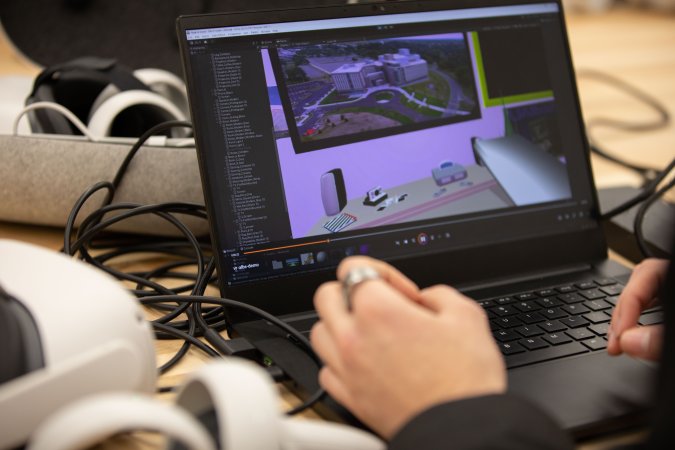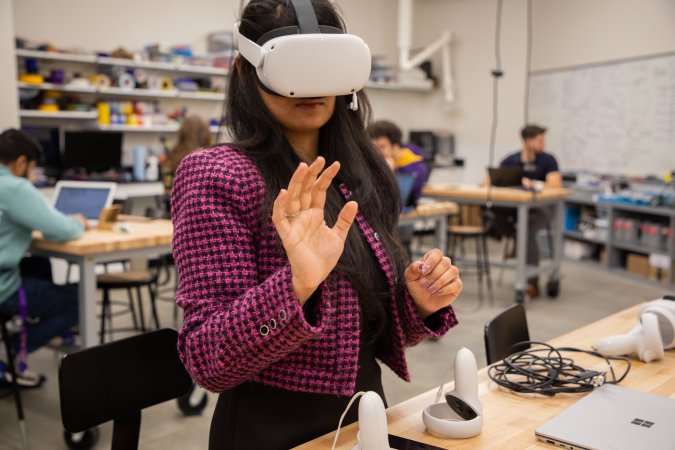CEHC Students Explore Virtual Reality Through Partnership with Meta, Unity

By Mike Nolan
ALBANY, N.Y. (April 11, 2023) — The metaverse, a network of 3D virtual worlds that use virtual reality (VR) to connect users around the globe, is expected by many to be the next big thing in tech.
There are already 400 million active metaverse users every month, and by 2026, it is projected that 25 percent of Americans will spend at least an hour a day interacting with each other and computer-generated objects and characters in the virtual world. The global metaverse market was valued at $61.8 billion last year.
Among those using VR are students at UAlbany’s College of Emergency Preparedness, Homeland Security and Cybersecurity (CEHC), thanks in part to support from Meta, the parent company of Facebook, and Unity, one of the industry’s leading 3D game development platforms.
CEHC Professor of Practice Michael Leczinsky was selected to receive 30 Meta Quest 2 headsets, the most popular and accessible VR headset on the market, through a “Create with VR Grant Program” offered by Unity, in partnership with Meta Immersive Learning.
The program aims to support secondary and post-secondary educators in empowering the next generation of metaverse creators.
“Similar to when smartphones first hit the market, virtual reality, augmented reality and mixed reality have the potential to create an enormous impact,” said Michael Leczinsky, a professor of practice in CEHC’s Department of Information Sciences and Technology, who applied for the headset grant. “These technologies can be applied to a wide variety of industries; the sky is the limit in terms of application.
“The equipment we received provides our students with direct access to cutting-edge VR hardware and offers valuable experiential learning experience.”
Create with VR
After participating in several professional development workshops with Meta and Unity, Leczinsky was selected among educators throughout the United States to receive the Meta Quest 2 headsets. This equipment builds upon the capabilities of the CEHC Makerspace, located in UAlbany’s ETEC research and development complex.
James Gillanders, a junior informatics major, is working with Leczinsky through a three-credit independent study that is focused on using VR for game development.
His projects this semester included the creation of a digital space that CEHC can use to interact with prospective students.
“I was an intern at the CEHC Makerspace last semester and liked it so much that I asked Professor Lecinzsky how we could continue working together,” said Gillanders. “The metaverse is a whole new way to experience interaction. I’m fortunate to now be equipped with the tools needed to familiarize myself with VR development and get creative.”
Vasuda Trehan, a first-year PhD student in information science, is also working with Leczinsky through a one-credit graduate independent study. She is interested in the application of VR in both educational and professional settings.
After graduating, Trehan is interested in working for NASA and is currently exploring ways that students can digitally explore space.
“There’s so much more to VR than just games,” said Trehan, a graduate of UAlbany’s computer science master’s program and native of India. “My research is aimed at exploring the future of VR and the metaverse, including how it can be used in education, research and our daily lives.”
Emerging Tech in the Classroom
Leczinsky’s research interests include multimedia, mixed reality, simulation and emerging technologies. He teaches several courses that focus on trends in emerging tech and also helped develop CEHC’s new Game Design and Development minor and concentration.
He plans to expand the rollout of Meta Quest 2 headsets to CEHC undergraduate and graduate classes, accepted student days, public outreach events with local K-12 schools and community organizations.
“This is a big opportunity for us. Not only to get our own students excited about VR, but others in our community as well,” Leczinsky said. “I’m grateful that Meta and Unity support our vision to take emerging tech education and research to the next level.”






